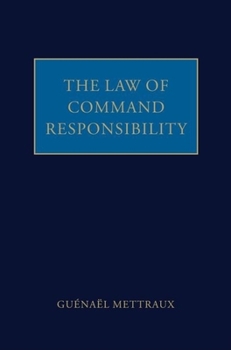The Law of Command Responsibility
The book offers a unique study of the law of command or superior responsibility under international law. Born in the aftermath of the Second World War, the doctrine of superior responsibility provides that a military commander, a civilian leader or the leader of a terrorist, paramilitary or
rebel group could be held criminally responsible in relation to crimes committed by subordinates even where he has taken no direct or personal part in the commission...
Format:Hardcover
Language:English
ISBN:0199559325
ISBN13:9780199559329
Release Date:May 2009
Publisher:Oxford University Press, USA
Length:300 Pages
Weight:1.50 lbs.
Dimensions:1.0" x 6.2" x 9.2"
Related Subjects
LawCustomer Reviews
0 rating





